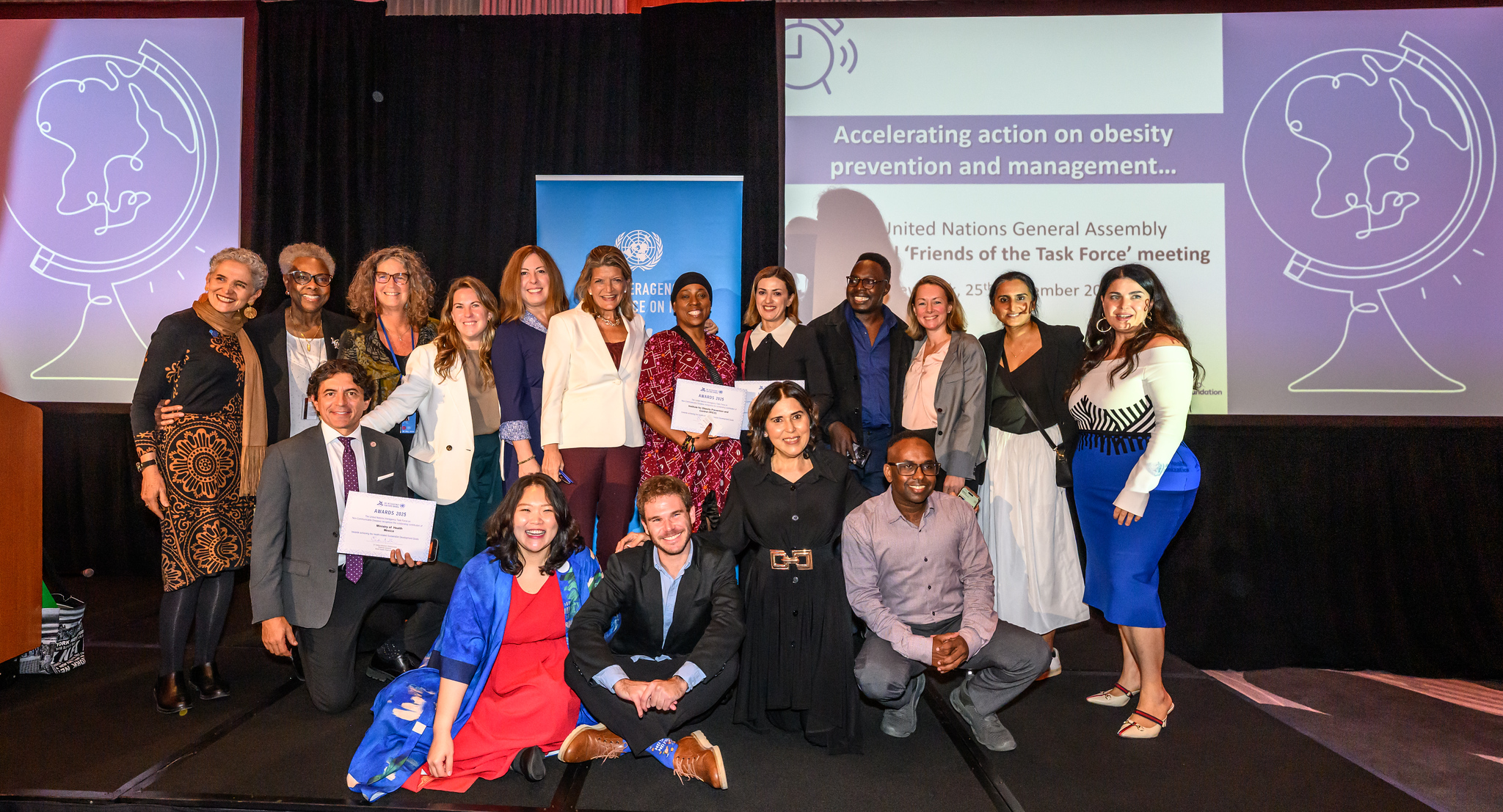
Winners of the 2025 Task Force Awards
Nineteen organisations were honoured with Task Force awards at the Twelfth Friends of the Task Force meeting during the 80th UN General Assembly in New York, on 25 September 2025.
This year the Task Force joined forces with the WHO Department of Nutrition and Food Safety, with the awards scheme being designed to solely recognize excellence in the prevention and management of obesity.
Luz Maria De Regil, Director of WHO Nutrition and Food Safety Department, and Nick Banatvala, Head of the Task Force Secretariat, announced winners in two categories: (i) Ministries of Health (or government agency under a Ministry of Health); and (ii) non-State actors (i. e., non-governmental organizations, academia, and foundations).
Ministries of Health (or government agency under a Ministry of Health)
National Department of Health, South Africa, for their leadership in tackling obesity through bold policies like the health promotion levy on sugar-sweetened beverages and the integration of obesity prevention into adult primary care services, with primary health care workers trained to screen, manage, and refer patients effectively.
National Nutrition Council, Philippines, for spearheading the Philippine Strategic Plan on Overweight and Obesity (2024–2028) and ensuring multisectoral action under the Philippine Plan of Action for Nutrition.
Ministry of Health, Timor Leste, for pioneering bold fiscal measures including one of the world’s highest excise taxes on sugar-sweetened beverages while expanding public fitness infrastructure and instituting school-based BMI monitoring to address obesity in both urban and rural populations.
Instituto Nacional de Salud Pública, Mexico, for pioneering a national sugar-sweetened beverage tax, and front-of-pack warning labels, alongside evidence-based advocacy, multisectoral collaboration, and capacity-building. By steadfastly overcoming industry opposition and sharing lessons globally, Mexico has established a model for effective, equitable, and scalable obesity prevention that has inspired countries worldwide.
Ministry of Health of the Hellenic Republic, Greece, for its leadership in the national action against childhood obesity, which promotes multisectoral partnerships, legislative reforms, and digital health tools to transform the food environment.
Ministry of Health, Portugal, for innovative leadership in obesity prevention through mandatory child food marketing restrictions, a sugar-sweetened beverage tax, and comprehensive food environment reforms, and establishing a national benchmark for effective, equitable public health action.
National Obesity Treatment Center, Qatar Metabolic Institute, Hamad Medical Corporation, Qatar, for providing multidisciplinary, age-appropriate obesity care, advancing research and professional training, and driving forward multisectoral initiatives to provide comprehensive obesity management.
Ministry of Health, Spain, for its leadership in obesity prevention through comprehensive, equity-focused, intersectoral action that mobilizes the collective expertise of government, scientific institutions, and civil society. The Plan to Combat Childhood Obesity has achieved measurable reductions in childhood overweight, including the promotion of health early-life nutrition, and active lifestyles.
Ministry of Health and Population, Egypt, for leadership in rolling out a comprehensive, life-course model of obesity prevention and management and including obesity in the National NCD Screening and Treatment Initiative for adults and children.
Ministry of Health, Seychelles, for innovative multisectoral action, engaging government, communities, and schools in initiatives such as the national ‘Stop Obesity’ campaign. By raising public awareness and mobilizing the whole nation, the Ministry has transformed obesity from an individual concern into a shared societal priority.
Ministry of Health, Malaysia, for its whole-of-government approach under the broader vision of “Healthy Malaysia” (Agenda Sihat Malaysia) with a shift towards preventive care, including initiatives such as the Quarter-Quarter-Half Campaign, school-based nutrition regulations, and integration of obesity management within primary care.
Ministry of Health, Saudi Arabia, for introducing front-of-pack labelling, food reformulation initiatives, and large-scale national physical activity campaigns such as ‘Walk 30’ and the Healthy Schools Program, advancing innovative digital health platforms, and setting a strong regional leadership in obesity prevention and management.
Non-State actors (i. e., non-governmental organizations, academia, and foundations)
Belgian Association for the Study of Obesity (BASO), Belgium, for leading obesity research and advocacy in Belgium, from developing the Belgian Obesity Staging System to launching the Obesity Platform Belgium and patient-led initiatives such as Infobees, creating a comprehensive framework for science, policy, and patient empowerment.
Cameroon Baptist Convention Health Services (CBCHS), Cameroon, for pioneering community-based obesity care in Cameroon, screening over 28,000 people through the ‘Know Your Numbers’ program and delivering long-term support in 19 specialized clinics.
Obesity Matters, Canada, for empowering people living with obesity through stigma-free, community-driven support, with its Obesity Matters (OM) Wellness Workshop helping 88% of participants feel more confident in advocating for their own care, and reaching over 10 million people globally through digital platforms.
Non-communicable Diseases Alliance, Georgia, for developing the country’s first peer-support program for people living with obesity, with its Healthy Lifestyle Champions Platform combining expert-led webinars, CBT-T (Cognitive behavioural therapy in ten sessions) for patients with non-underweight eating disorders, and ongoing peer support to achieve sustained behaviour change.
Red PaPaz - Corporación Colombiana de Padres y Madres, Colombia, for championing front-of-pack warning labels and a 20% tax on ultra-processed products in Colombia, as well as combining advocacy, litigation, and citizen mobilization to protect children’s right to healthy food environments.
Institute for Obesity Prevention and Control (IPICO), Russia, for driving systemic change in Russia through innovations such as an AI-powered obesity chatbot, a unified national registry, and citywide active-living initiatives, while bringing government, civil society, and industry together to reshape both care for those with obesity and food environments.
Desmond Tutu Health Foundation, South Africa, for bringing South Africa’s rights-based, community model of care to obesity, exemplified by Mpilo Health Park, a youth hub integrating exercise, nutrition, mental health, and sexual health which engages adolescents and has inspired national policy dialogue.
Notes
Winners were selected by a panel consisting of members of WHO and the Task Force.
This is the eighth year of the Task Force awards scheme.
The call for this year’s nominations was published in February 2025.
